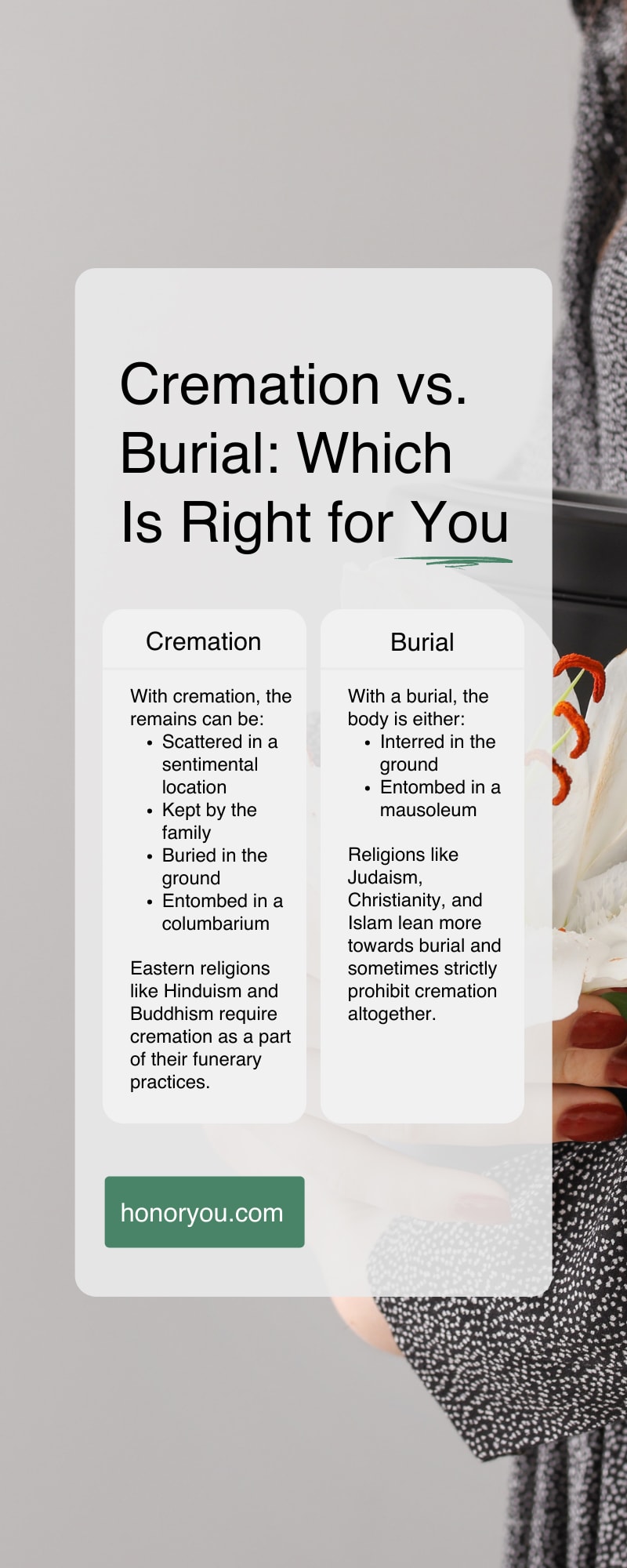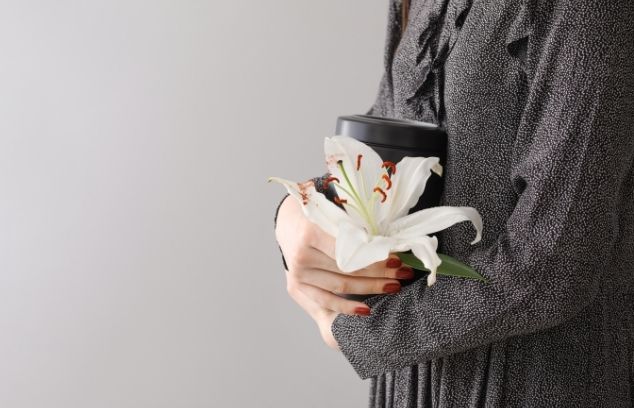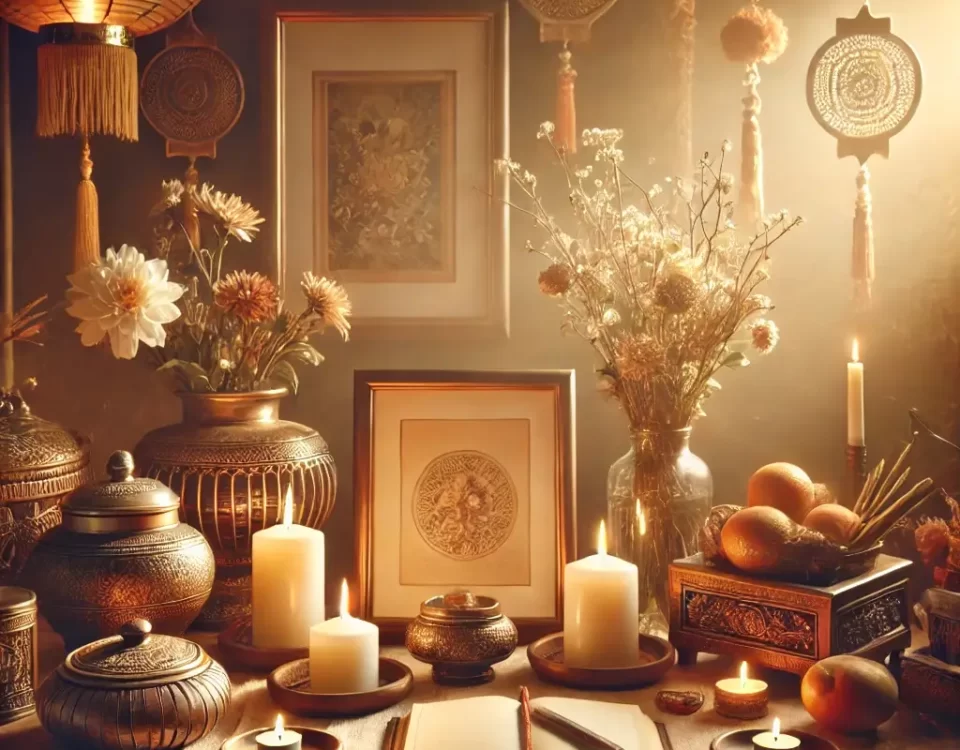Cremation vs. Burial: Which Is Right for You

Differences Between a Memorial and Celebration of Life
April 27, 2022Sharhon Monique Newsome-Craig
May 6, 2022Making final arrangements for yourself or a loved one is never easy. After all, there are various decisions to make about what kind of service you’ll have, whether or not to include extras like funeral keepsakes or casket pictures, and what floral arrangements you’ll want.
But perhaps the most challenging decision to make is whether cremation or traditional burial is most appropriate regarding taking care of remains. Let us help you through the process with this comprehensive guide on the subject.
Cremation Customs
In our discussion of cremation vs. burial and which is right for you, it’s crucial to understand the distinct customs of each. After all, how your or your loved ones’ remains will be treated and taken care of will hold weight in your ultimate decision.
When it comes to cremation, most of us understand that the remains of the deceased are broken down in an incinerator. Later on, the ashes are collected and put into an urn for family and friends to do with what they deem fit. After the cremation, loved ones will typically hold ash-scattering ceremonies.
During these ceremonies, all or part of the ashes are scattered in an area that holds sentimental to the deceased and their loved ones. And this is widely considered to be the equivalent of a committal service for burials. And just like traditional burials, cremation services typically include special music and readings, floral arrangements, and even final viewings before cremation takes place.
Burial Customs
Many find that cremation customs work best for them and are the most appropriate choice for their lost loved ones. However, traditional burial customs have just as much validity and value. With a funerary burial, the remains of a lost loved one are embalmed, dressed, and placed in a casket to be viewed by the grieving before the committal service occurs.
Rather than doing away with the bodily form of the deceased, traditional burials entail preserving them fully to represent the person exactly as they were in life. Further, because the deceased is preserved, burials require a casket, a designated burial plot, and a headstone.
And typically, once these things are secured, family members of the dearly departed will host a final viewing the day before the funeral and committal services occur. This allows those grieving to say their final goodbyes and extend their condolences to the family and close friends.
Major Differences Between the Two
As we’ve seen, cremation and burials have quite a bit in common, and at the end of the day, they’re both beautiful ways to say goodbye to those we’ve lost. That said, some significant differences between the two are worth mentioning—especially if you’re deciding which is most fitting for you or a departed loved one.
The most significant distinction between the two is that cremation entails the incineration of remains, while burials involve the complete preservation of remains. But more so, the methods in which the respective remains are taken care of differ a bit.
With a burial, the body is either:
- Interred in the ground
- Entombed in a mausoleum
With cremation, the remains can be:
- Scattered in a sentimental location
- Kept by the family
- Buried in the ground
- Entombed in a columbarium
You can also have remembrance keepsakes with cremation, such as pendants and bracelets made from the remains. With a burial, these options are not available. While the variety of ways remains can be taken care of draws folks to cremation, some still prefer the traditional burial. This typically has to do with how you and your loved ones feel that each method shows respect for the deceased.
Respect for the Remains
Another factor to consider in the debate of cremation vs. burial and which is right for you has to do with which method you feel respects the remains the most. For some, either choice is equally respectful. But for others, one might be viewed as more acceptable than the other. To illustrate, everyone wants to honor and commemorate their loved one’s memory.
To one group of folks, that could mean preserving the body’s integrity that is an extension of the person they loved. Then, bury them to immortalize that memory. To another group, burial may be viewed as unacceptable, as cremation is the ultimate way to set their spirit free and get the closure they need to move into their next chapter.
As a Reminder: this is all about personal preference, so don’t feel bad for wanting to do what’s best for you and your loved ones, even if those around you may feel differently.
Religious Elements
Of course, when it comes to last rites, many folks will base their decision on religious beliefs that are important to them or their lost loved one. For example, Eastern religions like Hinduism and Buddhism require cremation as a part of their funerary practices.
On the other hand, religions like Judaism, Christianity, and Islam lean more towards burial and sometimes strictly prohibit cremation altogether. So when you’re deciding how you’d like your or a loved one’s remains to be taken care of, consider which method aligns most with their religious leanings.
Of course, if you or the deceased were not religious, it truly becomes a matter of personal preference. In any case, it’s wise to evaluate these things when making your decision, as it could help you select the method that’s truly best.
Financial Factors
Lastly, it’s wise to consider the financial factors of both cremations and traditional burials before deciding. No matter what, funerals will cost a bit of money. After all, there are arrangements to be made, ceremonies to plan, and funeral homes to contact.
However, the overall budget you have for your ceremony will play a part in what kind of service you might have. For instance, traditional funerals include:
- Embalming services
- Burial plots and committal service
- Caskets and floral arrangements
- Transportation to the burial site
Plus, you’ll have to account for any extras you might want, like casket photos or nameplates. Added up, all these things can cost a pretty penny. But if traditional burial is what you or your dearly departed would have wanted and it’s within your budget, it’s worth doing.
On the other hand, say you have a limited budget but still want to host a beautiful ceremony. If so, you may decide to go the cremation route. You can still plan a beautiful service that honors your loved one’s memory.
But with cremation, you don’t have to worry about you or your family paying for a casket and casket panels or a burial plot and committal service, and everything in between. What you choose to do will ultimately depend on your personal preferences, budget, and the customs that align most with what you believe best.
In any case, cremation and burials are both beautiful ways to commemorate the memory of a lost loved one. And we hope this comprehensive look into both traditions helped shed some light on what might be the ideal choice for you or your loved one.



